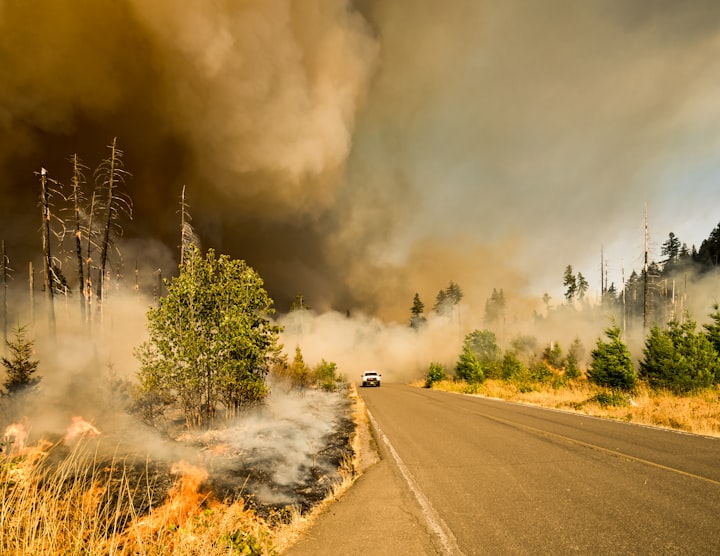Climate and Immigration
Where do we go if nothing is left?

I’d like to tell you a story about immigration. Ancestry (dot) com came around a few years ago and was something I was immediately intrigued by. To dig into your own history was something that seemed massively tantalizing. I filled out what I knew of my family trees and I texted and called Grandparents to help fill in more. I was interested in finding out how the people and stories had traveled through history to where I sit and type today.
It didn’t take long for some of those histories to reveal themselves. I traced one maternal descendants’ line back to some of the first English settlers that landed on the Atlantic coast in the early 1600's. Some far off Great Grandfather and Grandmother who met and married in a Village in Salem, their descendants living out many generations there before this country even existed in name. Some of their grandchildren would make their way into famous books I'd read, some about witches and Revolution, there’s a small museum in Massachusetts that’s adorned with the name of this line. I learned of a Great Uncle and Grandfather who fought and died as Loyalists in the Revolutionary War, further down the coast one of them was hanged by Patriots in a tree on the family farm he’d used to hide and protect members of the British Army. There on that same farm I also found the great grandfather who, likely in search of gold, left the east coast in the mid 1840’s and crossed the country ending up in California, then Oregon, and finally, Washington where my mother was born.
This is of course just one line, one strand that connects me to the past. On my paternal side, individual stories were more difficult to come by. Many of the Irish descendants on my paternal side arrived here in America much later in the mid 1800’s, some choosing Canada over America and slowly moving west for a couple generations before finally crossing into Montana, then moving west to Washington. Along the way I found a priest, a family of tee-totalers, a journalist. I followed a great grandfather and his brother through mining towns in Pennsylvania, then West Virginia, the Dakotas and finally Montana, where a couple of those strands would meet and then push a little further west into the small town in Washington where my father, my siblings and I were all born.
It feels wrong to say those ancestors who arrived in the early 1600’s on my maternal line really lived through the immigrant experience in the way we imagine it today. I’d say it was more of the colonizer experience. Sure, maybe they were leaving their home because they’d been persecuted somehow, but mostly, they were coming here to colonize new land, maybe for their King or their God or both, but they were entering what was to them a new and unknown land and there would be no immigration status for them to concern themselves with, no Ellis Island to pass through. They’d settle their land, grow their wealth and likely fight and kill whatever groups of the Native populations they couldn’t otherwise displace.
Those later arriving Irish descendants likely lived the more classic immigration story we hear about. There’s a ship log with their names on it, the stories you can find of Irish immigrants in the towns they lived in are those of discrimination against Catholics, and poor families huddled in small communities working menial jobs in coal mines and on railroads. It’s that story that I know more about from word of mouth. I’m lucky enough to have had a lot of time in my life with the Grandparents who are just a couple generations removed from these travelers I descend from. It’s those stories I was able to relate to the stories I’d hear from eastern European immigrants I met in my childhood, and later the stories I’d hear from Mexican, Central American and Asian immigrants that I’d work with in adulthood.
I remember having a conversation with a friend of mine a few years ago and I was walking him through all of this and when I finished he mentioned he’d had a family member try and setup a tree for their family. He’s Black, and was born on the West Coast, his Uncle was able to follow their roots back to the South and from there to the Carolina’s and that’s where the story mostly ended for him. Just a few generations back somewhere in South Carolina, as if out of thin air a Great Grandfather had just shown up one year as an adult on a census. DNA results would show what was assumed, his ancestors had made that awful journey from West Africa across the Atlantic that millions of others had made. Their previous histories stolen and their stories for generations going forward deemed unimportant, and unnecessary to keep track of in any tangible way, other than as line items on an asset list.
A year or two later I’d try and help my wife, who is of Mexican and Puerto Rican heritage, fill in more of her tree. We found ancestors living in and around Central and Northern Mexico for many generations, as we know in the 1800’s Northern Mexico was taken by force by the United States and it was divided into a handful of our Southwestern States and sometime around this arbitrary dividing of land and water, her ancestors had to immigrate through that arbitrary border to become Americans, a new title they had to hold to be given the privilege of living freely on the land their ancestors had been living on for if not hundreds, maybe thousands of years. Her Pureto Rican heritage even more abstract, the Island and their Native population having first been conquered by the Spanish hundreds of years ago, then taken over by the United States after a short war, Puerto Rico to this day exists in some confounding qausi-state-territory status, its citizens often sharing ancestry with the Native Islanders, the Spanish who first conquered them, the African slaves they brought along and the white Europeans who came after that.
I took a step back at some point and and while contemplating the expansive nature of human nomadism I tried to come to terms with the contextually brief story I was writing through the chapters of my own genealogy and the genealogies of those in my life.
It had become clear that for a white person with a Puritan lineage it was quite easy to find my story in modern history, for it was the story we teach and its the story we tell ourselves gladly. ‘Settlers’ building communities, discovering new lands, and fighting for righteous causes. At some point in that journey through modern history it became understood that those of a certain race and class had been entitled to a level of native belonging wherever they went, and that that same fortune would not be granted to others, even those we may find are already there in the 'New World' when we arrive. In the history we tell ourselves about America, white Christian men have always been the main character of the story, so there is no shortage of anecdotes that support and lift up the entitlements that come with that understanding. For basically any other group that has come here, or was here before we all arrived, your introduction to this new America is likely shrouded in mystery, your ancestors brought here violently and anonymously by slave traders, or their ancestral land violently stolen from them and renamed, best case scenario that mystery comes from your white ancestors relative poverty or maybe from some religious discrimination and subjugation that they faced when they arrived.
For millennia now, humans have travelled and settled land in order to find and plunder natural resources and to cultivate wealth, and in those interceding centuries we’ve inflicted massive suffering upon each other in the name of progressing that cause. We’ve now reached a point though in this human/earth relationship where we are soon going to face a major lack of livable, arable land and this will force if not tens of millions, then hundreds of millions of people to migrate to new places, places that likely have strict immigration laws, and are full of many nationalistic citizens who want their homes to remain just the way they are.
How do I know this? Because it's already happening. The refugee crisis that has been destabalizing the EU for the past decade has been caused in part by depleteing natural resources in the Middle East, specifically Syria where many social scientists and historians have come to the understanding that drought hastened by climate change was among the causes of the social unrest that led to their civil war earlier this century. In Central America both droughts and heavy flooding exacerbated by climate change have caused crop failures for millions of farmers, leading to tens of thousands of them to abandon their small farming villages with their families and move north to the United States, where our governments response has been to create a draconian immigration and refugee system that is totally void of humanity and has the expressed intent of dissuading people from trying to come here, no matter their desperation. This is an infuriating policy especially considering the majority of our American population still descend from Europeans, while these Central American refugee's ancestors have likely been migrating between present day Alaska and present day Panama finding and plotting arable land and escaping climate disasters for several thousand years.
Unfortunately, because of the harm we’ve already caused our planet and the damage that is already irreversible, these current immigration laws and climate related exoduses cannot coexist. The climate refugee crisis has already begun and without some kind of global cooperation and global solution to this crisis, I believe we’re all living the trailer for the dystopian movie we and future generations will soon be living. Does 9/11 still feel like it was just yesterday? In 2040 that’s what we’ll be saying about 2020, and I urge you to look closely at the predictions scientists have for what our earth will look like in 20 years. It doesn't have to all be wilfires, earthquakes and tsunamis to terrify you. Sometimes the falling dominoes that lead to massive catasophe are as seemingly innocuous as some corn fields dying in a neighboring country, or some crops being flooded.
When I looked back upon the stories of my ancestors, among the moments that caused shame, there were moments that caused pride. Pride mostly in their perseverance and their willingness to change, to move, to solve problems. For here I sit in Seattle, WA many thousands of miles away from the hills of Ireland that many of my ancestors left when the fields rotted and famine set in, surely many hardships have been overcome to get me here. For whatever wrongs many of our ancestors may have committed, and surely there were many, it’s hard to find evidence that at any point any of them became privy to so much irrefutable information regarding the fate of the earth and our species and then, simply ignored it.
The news and information we have today is so much more widespread, so much more storable and everyday we are leaving future generations millions of terabytes of data showing just how little we’ve done, despite having so much technology and so many tools at our disposal. I truly hate to consider the stories they’ll tell of us; the generations born through many generations of sacrifice knew what was coming, but could not find it within themselves to sacrifice much of anything for their own descendant's futures.
If you’re one of the some 50 million Americans who have been waking up in a cloud of smoke this last week, then you’re temporarily living through the decreasing quality of life we are all damning our children to. If that thought is putting a pit in your stomach I encourage you to find ways you can on a daily basis reduce your carbon footprint. I encourage you to lookup the climate plans of the politicians you plan on voting for this fall. I encourage you to talk with the young people in your life, ask them about their anxieties, and their fears, and the life plans that have been altered or forever delayed. I want you to consider every single policy in politics you care about and I want you to understand that none of them are even vaguely as important as this one, because Mother Nature holds Veto power over all of them.
About the Creator
Patrick O'Neill
I am a NW born & bred composer and writer currently living in Seattle, WA with my wife and two dogs. When I am giving my ears a break I enjoy writing about politics, social issues, race and everything else that keeps me up at night.






Comments
There are no comments for this story
Be the first to respond and start the conversation.